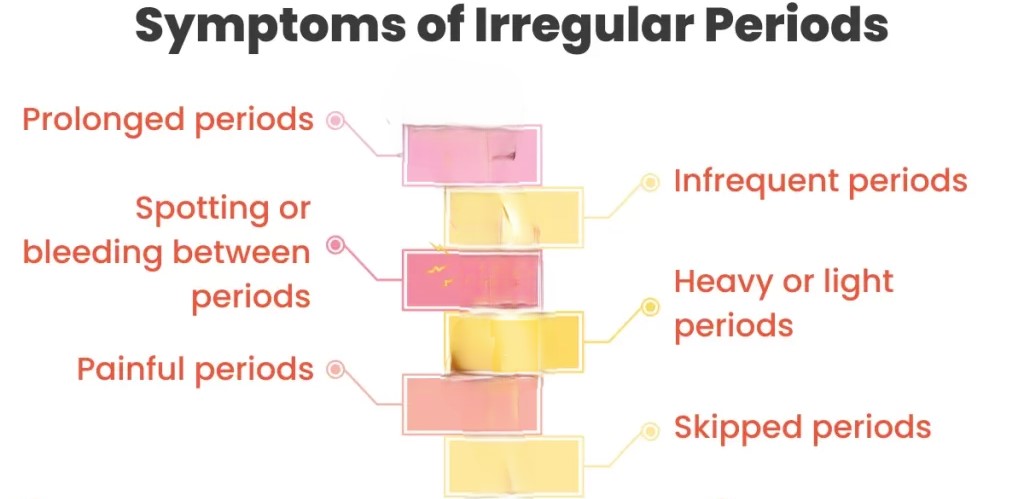Menstrual irregularities, including missed periods, heavy bleeding, and painful cramps, affect women globally. Ayurvedic Treatment for Menstrual Irregularities offers a natural approach to balancing hormones, addressing root causes, and promoting overall reproductive health. Ayurveda focuses on balancing the three doshas—Vata, Pitta, and Kapha—through diet, herbs, and lifestyle changes to regulate the menstrual cycle.
What Are Menstrual Irregularities?
Menstrual irregularities refer to abnormalities in the menstrual cycle, typically lasting 28 to 35 days. These issues can include:
- Irregular periods (cycles shorter than 21 days or longer than 35 days)
- Heavy menstrual bleeding (menorrhagia)
- Missed periods (amenorrhea)
- Painful periods (dysmenorrhea) These irregularities are often caused by hormonal imbalances but can also result from lifestyle factors, stress, or underlying health conditions.
Causes of Menstrual Irregularities
Several factors can contribute to menstrual irregularities. Common causes include:
- Hormonal Imbalances: Changes in estrogen and progesterone levels can disrupt the normal menstrual cycle.
- Polycystic Ovary Syndrome (PCOS): A condition where the ovaries produce excess androgens, leading to irregular or missed periods. learn more about for PCOS HERE.
- Stress: High stress levels can affect hormone production, disrupting the menstrual cycle.
- Thyroid Disorders: Both hypothyroidism and hyperthyroidism can lead to irregular periods.
- Dietary Deficiencies: Lack of essential nutrients like iron and vitamins can contribute to hormonal imbalance and irregular cycles.
Symptoms of Menstrual Irregularities
Symptoms vary depending on the underlying cause but may include:
- Irregular or missed periods
- Excessively heavy or light bleeding
- Severe menstrual cramps
- Fatigue and weakness due to heavy blood loss
- Mood swings and irritability linked to hormonal imbalance If left untreated, these symptoms can worsen, affecting overall reproductive health and well-being.

Ayurvedic Approach to Menstrual Irregularities
In Ayurveda, menstrual irregularities are seen as an imbalance in the body’s doshas. Each dosha affects menstrual health differently:
- Vata Imbalance: Causes irregular periods, painful cramps, and dryness.
- Pitta Imbalance: Results in heavy bleeding, inflammation, and mood swings.
- Kapha Imbalance: Leads to delayed periods, sluggishness, and weight gain.
By addressing the root cause of the imbalance, Ayurveda seeks to restore harmony to the body and mind, promoting regular and pain-free cycles.
Ayurvedic Herbs for Menstrual Health
Ayurvedic herbs are highly effective in managing menstrual irregularities by balancing hormones and improving blood flow. Key herbs include:
- Ashoka: Regulates menstrual cycles and reduces cramping.
- Shatavari: Balances female hormones and is particularly helpful for heavy bleeding.
- Aloe Vera: Soothes inflammation and helps regulate Pitta-related menstrual issues.
- Ginger: Alleviates menstrual cramps and supports digestion, reducing Vata aggravation.
Dietary Guidelines for a Regular Menstrual Cycle
In Ayurveda, diet plays a significant role in managing menstrual irregularities. Nutrient-rich foods support hormonal balance and reproductive health. Follow these tips:
- Eat warm, cooked foods: Helps to balance Vata and reduce cramping.
- Increase intake of iron-rich foods: Leafy greens, sesame seeds, and pomegranate are great options for managing heavy bleeding.
- Avoid cold and processed foods: These disrupt digestion and aggravate Vata, leading to irregular cycles.
Ayurvedic Lifestyle Practices for Menstrual Health
Incorporating Ayurvedic lifestyle practices can help regulate menstrual cycles and promote overall well-being. Some beneficial practices include:
- Abhyanga (Self-Oil Massage): Helps reduce Vata imbalance, easing menstrual cramps.
- Yoga and Meditation: Yoga poses like Baddha Konasana and Pranayama (breathing exercises) help reduce stress and balance hormones.
- Adequate Rest: Maintaining a consistent sleep schedule supports hormonal balance and regular cycles.
When to Seek Medical Advice
While Ayurveda can help manage many menstrual issues, there are times when medical advice is necessary. Seek professional guidance if you experience:
- Heavy bleeding that lasts more than 7 days.
- Missing periods for more than 3 consecutive months.
- Severe pain or cramping that disrupts daily life.
Conclusion
Ayurvedic Treatment for Menstrual Irregularities offers a natural and effective approach to restoring hormonal balance, easing menstrual discomfort, and promoting reproductive health. By understanding the causes and symptoms of menstrual irregularities and incorporating the right Ayurvedic practices, herbs, and diet, you can support a healthy menstrual cycle. According to the National Institute of Ayurveda, treatments focus on lifestyle changes, dietary adjustments, and herbal remedies to support hormonal balance.
